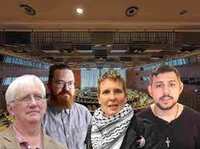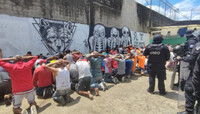Tunisia: stampa internazionale sotto assedio
by authorities
Civil Society's Media Caucus at WSIS expresses its indignation over a
series
of incidents in which Tunisian authorities have hampered the freedom of
expression of journalists and their freedom of association as well as
that
of others attending the Tunis phase of the World Summit on the
Information
Society.
In addition to problems involving denial of entry to Tunisia; the
following
incidents have occurred in the days preceding the summit:
Christophe Boltanski, a correspondent for the Paris daily newspaper
'Libération', was beaten and stabbed and had his personal effects
stolen
near his hotel in the embassy district. When he cried for help, guards
standing outside a nearby embassy did not intervene. The attack took
place a
day after Libération published Boltanski's report about clashes between
police and activists protesting in support of seven hunger strikers
campaigning for the release of political prisoners in Tunisia.
Representatives of Tunisian and foreign media and human rights
organisations
were prevented by a large number of Tunisian plainclothes police from
entering the Goethe Institute, the cultural centre of the German
Embassy in
Tunis, for a meeting to plan events parallel to the Summit.
A Belgian television cameraman approaching the Institute had his camera
seized by plainclothes police who forced themselves into the TV crew's
vehicle. The camera was only returned after the film cassette had been
confiscated. The police stated that no pictures may be taken in Tunisia
without prior official authorisation and prevented another reporter
from
taking photographs of the incident. A Tunisian journalist approaching
the
site was beaten by police.
Various websites which have contained criticism of Tunisia are
available to
the delegates at the official WSIS venue, but remain blocked and
censored in
the rest of Tunisia.
Such incidents call into question the seriousness of the Tunisian
government
to allow full freedom of expression and association at the WSIS.
The incidents show that prior concerns about the observance of human
rights
in Tunisia have been justified, underlining the widespread nature of
official abuses in the country.
They also illustrate that concerns about holding a United Nations
Summit
dealing with communication and freedom of expression in such a country
were
justified.
To correct the situation the Tunisian government and the International
Communication Union as the relevant UN authority organising the summit,
must:
- Guarantee equal right to access information via the internet both
within
and outside of the summit site.
- Guarantee that all journalists have the right to freely report in
Tunisia,
without fear or intimidation.
- Guarantee that the international media and summit delegates have the
right
to free movement and to meet with colleagues in the Tunisian media and
civil
society, outside of the official summit site, without threats or
intimidation from the police or government authorities.
- Ensure that Tunisian journalists and civil society members meeting
with
the international community are not subject to retribution and that
free
speech, press freedom and other human rights are respected in Tunisia
after
Summit delegates have gone home.
Given the above incidents and the overall poor human rights record of
Tunisia it seems to us that the UN system has contracted a moral
obligation
to follow up. It should name a special rapporteur to monitor freedom of
expression and other human rights in Tunisia.
For further information, contact Joel Rubin, ARTICLE 19, 6-8 Amwell
Street,
London, EC1R 1UQ, U.K., tel: +44 20 7278 9292, fax: +44 20 7278 7660,
e-mail: joel@article19.org , info@article19.org , Internet:
http://www.article19.org
Articoli correlati
 Come la lobby sionista è riuscita a criminalizzare il giornalismo pro-Palestina.
Come la lobby sionista è riuscita a criminalizzare il giornalismo pro-Palestina.Difendere la resistenza palestinese è diventato un crimine in UK
Karl Marx godeva di maggiore libertà di espressione e di stampa durante il suo soggiorno a Londra fine '800 di quanto non gode oggi un comune giornalista britannico se parla a favore della liberazione della Palestina.17 febbraio 2025 - Patrick Boylan In manette il fondatore di Telegram
In manette il fondatore di TelegramL'arresto di Pavel Durov è un pericoloso precedente
L'inchiesta francese richiama alla mente il caso Edward Snowden, il tecnico informatico ricercato per aver rivelato come diverse multinazionali del digitale avessero collaborato con l'Agenzia per la Sicurezza Nazionale (NSA) degli Stati Uniti, consentendo l'accesso ai dati privati degli utenti.25 agosto 2024 - Alessandro Marescotti Identità etnica e culturale, tradizione religiosa e Stato forte e ben armato
Identità etnica e culturale, tradizione religiosa e Stato forte e ben armatoIl concetto di sicurezza nazionale israeliana e la sua recezione in Italia
Sulle modalità di esercizio del potere il governo italiano ha trovato in quello israeliano una felice combinazione fra teoria e prassi4 giugno 2024 - Rossana De Simone Il presidente Daniel Noboa vuol costruire degli enormi penitenziari per fermare la delinquenza
Il presidente Daniel Noboa vuol costruire degli enormi penitenziari per fermare la delinquenzaEcuador: un paese carcere
Negli ultimi cinque anni il tasso di violenza è quintuplicato9 gennaio 2024 - David Lifodi
Sociale.network